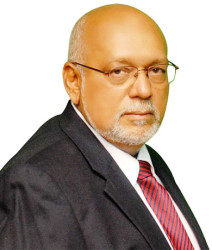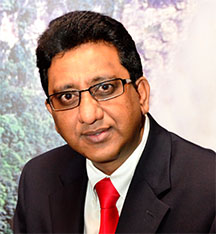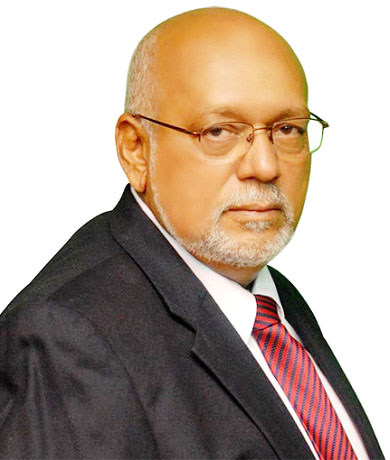Former President Donald Ramotar and immediate past Attorney General Anil Nandlall yesterday defended their party’s record on constitutional reform saying that it is now up to the APNU+AFC government to fulfil their manifesto commitments and take up from where the PPP/C had left off.
Making reference to a news item in yesterday’s Sunday Stabroek where constitutional expert, Professor Harold Lutchman and head of the 2000 Constitution Reform Commission, Ralph Ramkarran stated that neither the coalition government nor the opposition PPP/C appear to have any appetite for constitutional reform, the duo said the PPP/C should be excluded from the criticisms.


“I don’t believe that the statements (Lutchman’s and Ramkarran’s) ring true for the PPP because we promised that we will change the 1980 constitution and we changed it. We made nearly 200 changes to it. We did not do it unilaterally but through the broadest .. process,” Nandlall argued, referring to the process initiated in 1999.
“The PPP position on constitutional reform is consistent. We believe the constitution should remain under scrutiny and we are of the view that constitutional reform is a consultative process …On the other hand the statement rings true, for the APNU+AFC .We didn’t promise constitutional reform in our manifesto, they did that, and they said within 100 days the public would have seen the process started, but 600 days have passed and it has not commenced,” he added.
Lutchman and Ramkarran told this newspaper that the 18-month-old coalition-led government and the opposition People’s Progressive Party/Civic (PPP/C) do not appear to have any appetite for constitutional reform, with both sides historically wary of giving up presidential powers.
“What they support when they are in government is entirely different to what they support when they are out of government. The same thing they criticize when they are out of power, the same thing when they are in power they don’t see anything wrong with,” Lutchman, who was a member of the 2015 Steering Committee for Constitutional Reform (SCCR), told Stabroek News in an interview. Prime Minister Moses Nagamootoo received the SCCR report on April 30th, 2016 but six months later it has not been released neither have plans for it been announced.
Lutchman’s view was echoed by Ramkarran who said that the APNU+AFC-led coalition government has been very slothful in getting the process started, although it would have been high on its manifesto priorities.
When the APNU+AFC coalition won office last year May, the SCCR was appointed by Prime Minister Nagamootoo and comprised attorneys C A Nigel Hughes, Gino Persaud and Geeta Chandan-Edmond, Lutchman and Haslyn Parris (who has since passed away).
The Prime Minister had explained that the remit of the committee was to give direction and scope within which the constitutional reform process should take place. He noted that the coalition parties had placed the issue of constitutional reform high on their agenda.
However, to date, except for President David Granger saying, during the airing of his weekly ‘Public Interest’ programme, that proposals for constitutional reform should come from the people following widespread consultations, no information has been forthcoming from the government.
Stabroek News tried contacting Nagamootoo through the Department of Public Information for an update on the process. This newspaper was told by Director of Public Information Imran Khan to send questions via two email addresses given last week Tuesday and this was done. Khan replied on Thursday but said that Nagamootoo had advised that he would have at last Friday’s Parliamentary sitting addressed “matters relating to constitutional reform in parliament and would prefer to not comment prior to his address”.
He said that he anticipated that “most, if not all” of SN’s questions will be addressed during his presentation.”
He also pointed to an excerpt from President Granger’s October address to the National Assembly. Of course, you would have heard His Excellency’s address to Parliament in October when he stated “[y]our Government is committed to good governance. It is committed to reforming the Constitution. It will, in this regard, convene a Consultative Constitution Reform Commission in 2017.”
Observers have pointed out that the vague reference to 2017 would call into question the solemn manifesto commitments by the coalition to a swift process.
On Friday in Parliament, Nagamootoo did not address any of the issues Stabroek News had sought clarity on.
‘Release the report’
Former President Ramotar says that Nagamootoo should release the report presented by the SCCR as its contents could have recommendations that both parties can agree on and they can then build a plan from there
“Maybe the report which the Prime Minister has may form the government’s proposal to the committee and that is why it is important it should be made public. It will have to be made public anyway,” he said.
Convenor of the SCCR Nigel Hughes, when contacted by Stabroek News last week for comment explained that it would not be appropriate for him to speak on the report he had submitted to the Prime Minister. However, he said, “My personal view is there is no appetite for constitutional reform.”
In the SCCR report, the group stated that it saw the completion of the entire constitutional reform process within 18 months and recommended a reduction of immunities for the President, limiting the powers to prorogue or dissolve Parliament, and excluding the Attorney General from Cabinet so that the holder of that office remains unbiased and impartial.
A three-tiered reform system has been recommended by the body, where a group of legal experts on the Constitution Reform Commission (CRC) will prepare a draft document encompassing some of the SCCR’s recommendations. This will then be distributed to stakeholders including representatives of political parties and civil society. The CRC will then be expanded to include representatives of political parties and civil society. The expanded CRC will then deliberate on submissions received and prepare a report to be perfected by its legal experts. This report will then be taken to the National Assembly for debate after which a referendum or some other method would be employed for the prospective adopting of the recommendations.
President Granger later stated the need for broad consultations on constitutional reform as he did not want a “boardroom constitutional reform,” but did not give any indication as to a timeline for the process after being asked whether it would be pursued vigorously or whether it would be placed on the backburner. He did say that his administration will be proceeding to discuss the SCCR report more fully.
But both Nandlall and Ramotar are calling on the Granger administration to hold true to its promises for constitutional reform and argued that it can start the process by ensuring that the parliamentary Standing Committee on Constitutional Reform is functional.
They said that the committee’s composition has to be structured to reflect the opposition’s representation in parliament, as their views will also be reflective of their respective constituencies, if government wants to ensure the amendments proposed are passed.
“A good place to begin the process is…the standing committee on constitutional reform… since the last constitutional reform process was completed, it was recognized that constitutional reform must be an ongoing process and that is why a standing committee on constitutional reform was established,” Nandlall asserted.
“That committee has the power to enlarge its membership and to hold widespread consultations as well as to co-opt any number of experts, it may think necessary, to do its work. In my view, that mechanism should be the mechanism to be used for constitutional reforms. I believe as far as possible that committee should be balanced in its membership and in the discharge of its mandate must hold consultations and invite recommendations,” he added.
‘Actions and words’
The PPP Executive said that he believes that constitutional reform is just another platform promise made by the coalition, while in opposition, which they have no real intention of fulfilling.
“The approach to constitutional reform of the coalition government can be gleaned from their actions as opposed to words, in the tenth parliament which they controlled with a one-seat majority. In that parliament, the then Leader of the Opposition (Granger) was the chairman of the standing committee on constitutional reform. In approximately three years that committee only met twice,” Nandlall asserted.
“In the 11th parliament that committee, though appointed, and chaired by the Attorney General, has never met once. So the words of those in government on constitutional reform do not match, their actions. The government in an effort to pay lip service to its platform promise on constitutional reform, unilaterally and without any consultation whatsoever, established a constitutional reform steering committee (SCCR). This committee, as far as I am aware, again held absolutely no consultations with anyone, prepared a report, handed same to the Prime Minister, and no one has heard or seen this report since. It is what the people in Trinidad would call `mamaguy’. I don’t think and there is no evidence to suggest that the government is serious about constitutional reform,” he added.
It is Nandlall’s opinion that ever so often, when it is convenient and politically conducive, government “drops a line here and there about constitutional reform but it is not followed up with any tangible actions”.
‘Worrying’
And while a slothful attitude towards starting the constitutional reform process is worrying for the two PPP executives, they explained that their party is even more concerned about what amendments the APNU+AFC coalition would push for the constitution.
“What is worrying to me though, is that assuming that this government embarks on constitutional reform, what those reforms are going to be. My apprehensions are grounded in the executive’s consistent and persistent tendencies to interfere with and undermine, independent constitutional agencies, whose functions primarily are …oversight and to scrutinize executive conduct, to ensure that they do not abuse their powers.
“This government continues to evince an unacceptable degree of intolerance, to scrutiny from these agencies, as a result, there appears to be a clear policy to undermine, interfere with, emasculate and launch verbal assaults on these agencies… and having regard to the political philosophy which inspires such actions I fear that the thrust of a constitutional reform process under this administration, might be one that seeks to constitutionally emasculate these agencies and reduce scrutiny of the executive rather than expand scrutiny . So we may be moving in the direction of enlargement of executive power coupled with the simultaneous reduction of oversight and scrutiny over the executive. Fortunately, most of these constitutional changes will require the support of the opposition and therefore the government will not succeed with such an agenda,” he added.
For his part, Ramotar give his views on what changes government might want and said he does not think it is sincere.
“I am concerned about the sincerity and I don’t believe that they want it and anytime they trouble it, it may be to take it back to the Burnham time”, he stated.






